Old Cases, New Cases, Sad Cases, True Cases
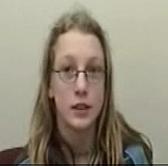
A 13-year-old babysitter accused of shaking a toddler to death
An exasperating series of convictions and exonerations has reminded me both how big a price child-care providers are paying in the child-abuse arena and how hard it is to pin down the facts about shaken baby syndrome.
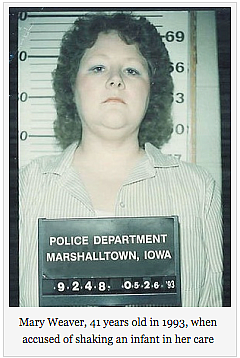
On a January morning in 1993, care provider Mary Weaver called 911 for help when the infant fell unconscious about 45 minutes after arriving at her home. Autopsy revealed a healing skull fracture, but doctors concluded the girl had been shaken to death—and based on the common wisdom that the symptoms of a serious shaking are immediate and obvious, prosecutors targeted Weaver.
Her first trial ended with a hung jury, her second in a conviction and a life sentence. Then new witnesses came forward, to report that Melissa had been knocked unconscious in a fall before arriving at Weaver’s on that critical day. Weaver was granted a new trial in 1996, and was acquitted by a jury in 1997.
The case changed the mind of forensic pathologist Dr. Vincent Di Maio, for many years the editor-in-chief of The Journal of Forensic Medicine & Pathology. Called in for his opinion, Di Maio read Melissa’s medical records and realized the common knowledge about timing of infant head injuries was wrong. The girl had been seen by her family doctor three times for the flu in the week before she quit breathing in Weaver’s care.
“That case is very disturbing,” DiMaio told me in 2000, “because everybody agrees that the skull fracture is seven days old, and everybody agrees that the doctor saw this child and thought she looked normal… But we know she already had cortical necrosis [dead brain tissue] and thrombosis [clots inside the vessels]… Whether or not you believe the babysitter killed the kid, you know a serious brain injury went unnoticed by a professional observer.”
The case has not appeared in the medical journals, but Mary Weaver was in the news last month when her name was added to the National Registry of Wrongful Convictions, maintained by the University of Michigan Law School and the Center on Wrongful Convictions at Northwestern University School of Law. The registry offers a summary of Weaver’s case, and her local newspaper covered the registration story.
Kelly Kline, Not Guilty

Even more remarkable in the case of 15-month-old Ella Young, the treating physicians had a plausible explanation for the fracture: The girl had fallen down the stairs at her mother’s split-level home a week before developing breathing problems at Kline’s house. Dr. Richard Daryl Steiner, however, a pediatrician at Akron Children’s Hospital, concluded that the fracture was irrelevant and Ella had died of shaking injuries inflicted immediately before her meltdown. He and Summit County Medical Examiner Dr. Lisa Kohler both testified for the prosecution at Kline’s trial
Forensic pathologist Dr. John Plunkett testified for the defense, arguing that the fall six days earlier could have set off a slow neurological response that reached a critical threshold without a violent trigger.
The good news is that the jury found Kline not guilty—the Wooster Daily Record, which had earlier published the charges without question, including Kline’s name and address, also covered the not guilty verdict this past fall.
The tragedy is that child protection professionals continue to press these cases. Kline says she understands that she was lucky to be found innocent, but she and her family are still struggling to recover from the financial and emotional costs.

Throughout more than one difficult interrogation, Kline never wavered from her original story, although keeping her head wasn’t easy, she recalled. “Lieutenant [Kurt] Garrison told me, ‘All fingers are pointed toward you. The forensic science says you did this. Dr. Daryl Steiner says you did this. There are no other suspects’ . . . He had me so frustrated the way he was turning it around, he almost made me believe I did something wrong.”
Ashley Howes, Compensated
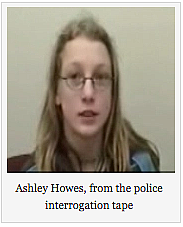
The girls were having a good time, and on Sunday afternoon Ashley agreed to extend her stay. But then, less than an hour after she was left alone with the sisters, Ashley called 911 for help with an unconscious toddler, her charge Freya.
The shaking diagnosis came quickly. Police picked up Ashley at the hospital and took her to the station, where they interrogated her for a total of 19 hours, turning on the video recorders at about 3 am. You can see what the Seattle police considered to be the damning portion of the interview in the 48 Hours coverage of the case.
Ultimately, Judge Mary Roberts excluded the tapes from evidence, noting that detectives had ignored what she considered Ashley’s recorded invocation of her right to remain silent. With the tapes excluded, prosecutor Kathy Van Olst then asked the court to withdraw the charges, with the argument that the tapes were essential to proving the necessary timeline.
The 48 Hours coverage in 2006, after the charges were withdrawn, offered this background information on shaken baby syndrome:
According to most doctors, the only other way Freya could have sustained these kinds of head injuries would have been from a high-speed car accident or a fall from a great height, two things she was not involved in that weekend…
Dr. Brian Johnston, the chief of pediatrics at Harborview Medical Center, says he thinks Freya suffered an inflicted injury.
“In severe or fatal shaken baby cases, the symptoms would be apparent immediately after the shaking. They have difficulty breathing. They lose consciousness,” says Johnston.
Johnston did not treat Freya that night but has studied shaken baby cases. Does he think a 100-pound child could create enough force to kill a 26-pound baby?“
A 100-pound child is the size of many average-sized grown women. Unfortunately, we know that people that size are capable of inflicting these injuries on children,” says Johnston.
After the charges were withdrawn, the police, the district attorney’s office, and Freya’s family all told reporters for 48 Hours that they still believe Ashley is guilty. Her defense attorney Bryan Hershman, however, said, “I don’t want this little girl to live the rest of her life with people saying she got off on a technicality. She didn’t. She’s innocent.”
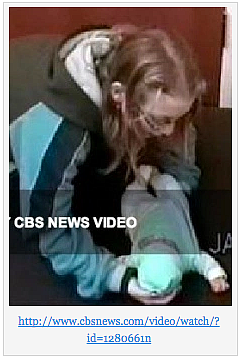
Ashley’s story was in the Seattle Times in March when the city reached a financial settlement with her parents, who had filed a civil suit in 2011 against the police for their callous and deceptive treatment of their daughter.
What I wish is that the doctors who make these black-and-white pronouncements about causation and timing would speak personally with the people they’re accusing, and not just send the police in to badger out confessions. I think they are missing out on a lot of valuable information. The police claim that Ashley confessed to “shaking” Freya twice, for example. One of those two incidents was earlier in the day while she was giving the girl a bath, before the parents left the house. If Ashley shook Freya violently at that time, and the symptoms are as immediate as Dr. Johnston says, would Freya’s mother really have called Ashley’s mother later in the afternoon and asked to keep her longer? If that “confession” isn’t accurate, what about the other one? I just don’t understand their sureness in the face of these uncertainties and conflicting tales.
Suzanne Johnson, Supported
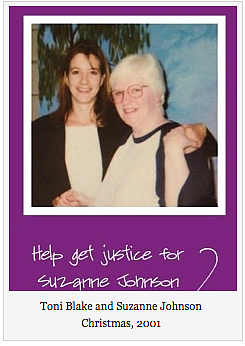
Johnson’s conviction politicized her young jury consultant, Toni Blake, who was sure her client was innocent. While studying the medical literature for Johnson’s trial, Blake realized how unprepared most defense attorneys are for infant head injury cases, so she now offers a primer on shaken baby syndrome on the web site for her consulting business, Second Chair Services.
After years of work by Blake and others, the California Innocence Project has now taken on Johnson’s case.
Later this month the project is starting an Innocence March to the state’s capitol in Sacramento, where marchers will ask for pardons from Governor Jerry Brown for 12 convicted prisoners. The first leg of the walk, from San Diego to Ocean Beach, is dedicated to Johnson. Blake reports that Innocence Project attorneys have drafted a habeas corpus brief in the case that will be filed in 2013.
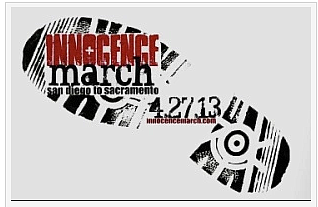
Marina England, Convicted
A case of witnessed shaking has led to a felony conviction for aggravated battery in Illinois, where a mother told police she arrived to pick up her two daughters and found care provider Marina England screaming at the 3-month-old and shaking her.
The child seems to have shown no behavioral changes or diagnostic signs like bleeding or swelling, but Ariel Cheung, writing in the The Register-Mail, reports that two days after the incident, when the infant was brought in for an abuse evaluation, Dr. Channing Petrak, medical director of the University of Illinois Pediatric Resource Center in Peoria, diagnosed “a mild traumatic brain injury, more commonly known as a concussion.”
I’m not sure what criteria Dr. Petrak used to reach her diagnosis, but according to the news report, her testimony was key to the judge’s verdict.
If you are interested in more on witnessed shakings, please see this blog posting from the fall of 2012.
copyright 2013, Sue Luttner
If you are unfamiliar with the debate surrounding shaken baby syndrome in the courtroom, please see the home page of my SBS site and blog.

